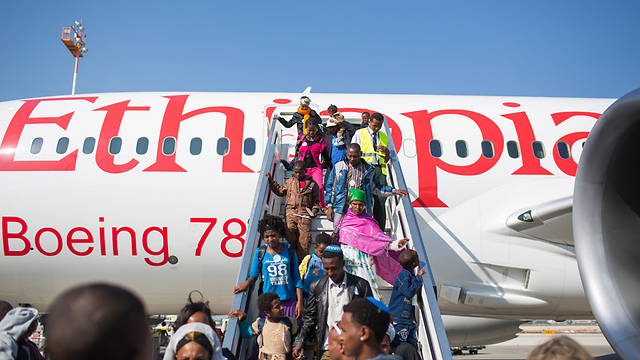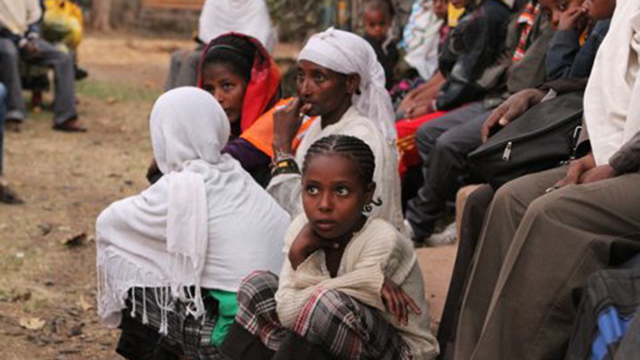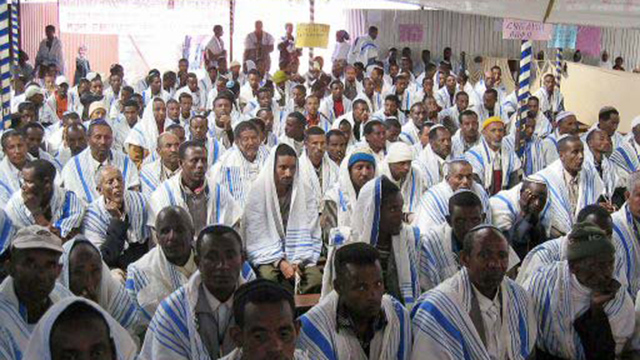
Ethiopian Jews arriving in Israel
צילום: אוהד צוויגנברג
Gov't freezes final aliyah of Ethiopian Jews over budgetary issues
Plan approved in November was not allocated a budget, leaving some 9,000 members of the Falash Mura community stuck in camps in Addis Ababa and Gondar, where some have been waiting for over a decade.
Three months after the government approved a plan to bring the remaining members of the Falash Mura community from Ethiopia to Israel, Ynet has learned that it was put on hold until a budget can be found for it.

The director-general of the Prime Minister's Office, Eli Groner, sent an email to the team in charge of the plan's implementation, telling them that due to the fact the government approved the plan without allocating a budget for it, the aliyah of over 9,000 people still waiting in Ethiopia will be suspended until the NIS 3 billion required to fund it are allocated.
The plan is the result of an extensive public campaign that has been waged by Israeli Ethiopians, Knesset members and volunteer organizations since late 2010, when the government decided to stop the organized aliyah efforts from Ethiopia.
Members of the Ethiopian community in Israel have bemoaned the fact that government decisions made in recent years created a situation in which families were split apart. Thousands of Ethiopian Jews that arrived in camps set up by the State of Israel and Jewish organizations in Addis Ababa and Gondar were not allowed to make aliyah because they did not meet the necessary criteria, and their Jewishness was put in question.
MK Dr. Avraham Naguisa (Likud), the chairman of the Knesset's Immigration, Absorption and Diaspora Affairs, criticized the decision to put the plan on hold, accusing government officials of "repeatedly ignoring government decisions and the law out of racist reasons, and further deepening the institutional discrimination against Ethiopian Jews."
Naguisa went on to say that "every day that passes by and officials in the government ignore the situation of the remainder of Ethiopia's Jews and their families in Israel, they enable the death of those waiting in the Jewish communities in Addis Ababa and Gondar."
The Likud MK said freezing the plan constitutes a red line for him, and that there are others in the party who will support him on the topic.
The plan, which was both approved by the government and received the go-ahead from the Finance Ministry, determined that the organized immigration of the Jews waiting in Ethiopia will begin within four months.
It also determined that the interior minister will examine the applications of 9,146 members of the Falash Mura community who meet different criteria, based on the Citizenship and Entry into Israel Law. Some of them have been waiting since 1999 to be permitted into Israel.
The plan noted that this would be the last state-organized aliyah of Ethiopians to Israel, and that following this aliyah, requests by Ethiopian nationals seeking to make aliyah to Israel claiming they belong to the Falash Mura community will no longer be approved.
A special team was formed to implement the decision, including the director-generals of the PMO and the Immigration Absorption Ministry, and representatives from the Administration of Border Crossings, Population and Immigration, the Finance Ministry's Budget Department, and the Jewish Agency. The team was supposed to present its recommendations on the topic for government approval within 60 days.

Members of the Falash Mura community arriving in Israel (Photo: Ohad Zwigenberg) (צילום: אוהד צוויגנברג)
Argawi Taspa, who made aliyah with his family in 2004, has been waiting for his sister Kassa to be allowed into Israel for 12 years now. He said the decision to put the plan on hold has led him to feel "disappointed and frustrated. We've lost our trust in the government."
"We feel like we've been cheated. This is plain racism; they're being treated like problematic people. I don't think this would have happened to olim from any other country," he added.
Taspa, who serves in reserves in the Paratroopers' Special Forces Company, has been fighting to bring his sister to Israel for years. He claims the government is looking for excuses not to bring the remaining 9,000 Ethiopian Jews to Israel.
"After everything has already been approved by the ministers, we're told there's no money. That's a fabrication. There are thousands of people in a difficult situation in the camps, after having left their villages. They sold everything they had hoping to come to the land of Israel and have been waiting for over a decade. My sister packed her bags in 2004. They told it would take a week, and she's been waiting for 12 years now."












